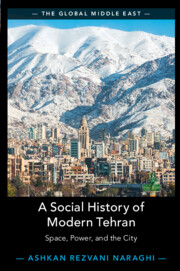Book contents
- A Social History of Modern Tehran
- The Global Middle East
- A Social History of Modern Tehran
- Copyright page
- Dedication
- Contents
- Figures
- Tables
- Foreword
- Preface
- Introduction
- 1 Segmented Society and the Social Production of Communal Spaces
- 2 Segmented Society and Spaces of Political Mobilization
- 3 Iranian Travelers and the Production of Spatial Knowledge
- 4 The Qajar Court and the City
- 5 The Interwar Period and Middle-Class Urbanism
- 6 The Age of Social Movements
- Conclusion
- Appendix Protest, Political Gatherings, and Parades between 1941 and 1953
- Bibliography
- Index
Introduction
Published online by Cambridge University Press: 22 December 2022
- A Social History of Modern Tehran
- The Global Middle East
- A Social History of Modern Tehran
- Copyright page
- Dedication
- Contents
- Figures
- Tables
- Foreword
- Preface
- Introduction
- 1 Segmented Society and the Social Production of Communal Spaces
- 2 Segmented Society and Spaces of Political Mobilization
- 3 Iranian Travelers and the Production of Spatial Knowledge
- 4 The Qajar Court and the City
- 5 The Interwar Period and Middle-Class Urbanism
- 6 The Age of Social Movements
- Conclusion
- Appendix Protest, Political Gatherings, and Parades between 1941 and 1953
- Bibliography
- Index
Summary
This book is about an ontological shift in the conceptualization and representation of the spatiality of Tehran, the capital of Iran, as the outcome of the formation and establishment of a novel spatial discourse. Between the mid-nineteenth and the mid-twentieth centuries, this novel discourse sidelined the indigenous knowledge of Iranian urban society and the state and became the legitimate sources of imagining and producing the spatiality of Iranian cities. It transformed the spaces of the social, political, and economic processes in Tehran and elsewhere in the country. This shift was ontological and spatial, meaning that it brought about novel frameworks for urban society and the state to produce the spaces of their daily practices and strategies. This shift was discursive, leading to the abandonment of the traditional and indigenous spatial understanding in a long process of knowledge production; society and the state internalized a novel form of knowledge as the authentic source of producing the spatiality of social, economic, and political relations. This shift targeted both the state and society; it was top-down and bottom-up simultaneously. As the book suggests, since the mid-nineteenth century, this new spatial discourse has reproduced Tehran; the contours of the current city should be read through the analysis of this discursive transformation.
Keywords
- Type
- Chapter
- Information
- A Social History of Modern TehranSpace, Power, and the City, pp. 1 - 12Publisher: Cambridge University PressPrint publication year: 2023

